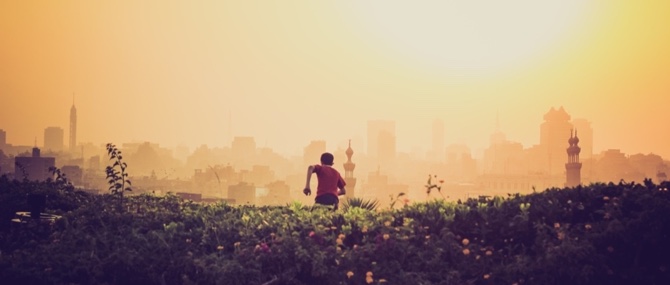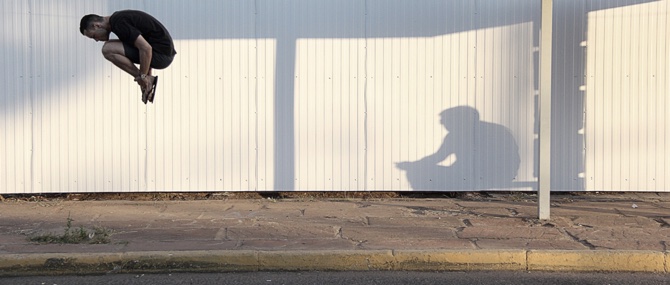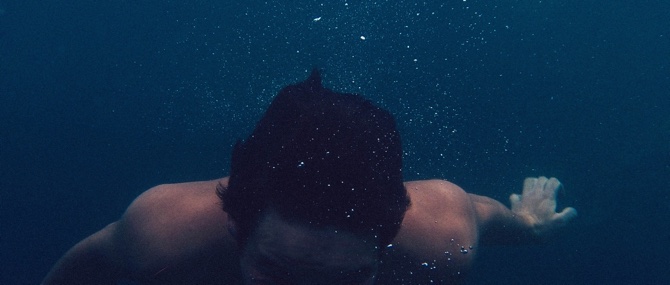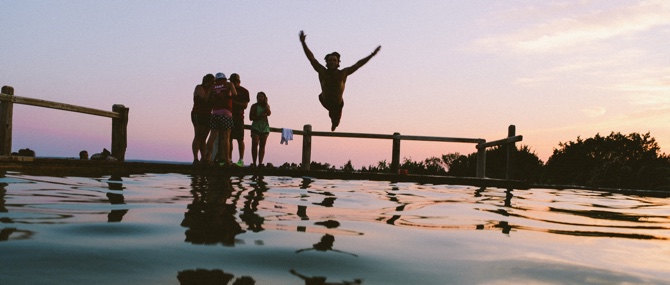
I place my prayer rug on the floor in the direction of Mecca. It came from my grandparents, I think, from the old country. It has been a part of my life since I was a child, a fixture in our home, and now it is threadbare from wear. It’s limp like fresh chapati. The burgundy, velvet fibres fray on the parts of this rug that have cushioned our heels and knees for decades. I smooth out its wrinkles and bumps and imperfections with the brush of a flat, tender palm, like I’m tending a bed of soil in a garden. I sit beside it or on the edge of my bed for a minute or two. I breathe.
Do I ever really want to pray, or do I want to run? I know that I desperately want prayer to be a source of joy and healing. I also know that, at the moment, it isn’t that for me. It’s mere obligation, habit. Running is so much easier. I want to go back to distracting myself. My thoughts and emotions are busy chasing down memories.
I show up for prayer anyway, because my hope is stubborn, because my part of the bargain is showing up, because having faith means being able to depend on someone. I’m often disappointed by my approach or by the silence that greets me, so I run away. But sometimes… Sometimes I find myself running until the oxygen escapes, and I hunch over to catch my breath, and I finally ask myself what the point of running even is. Maybe I don’t need to run. Maybe we can face the darkness together, here, now.
I stand a few paces behind the prayer rug, this portable sacred space, and I merely look at it, thinking about what I’ll do there, who I’ll meet there. I let my arms hang at my sides and face the wall before me, let my face relax, and then I step forward onto the rug, and stand on the threadbare fabric. A shot of breath. Toes edge over the tip of the diving platform. I look down at the surface of the water ten metres below. It’s a long drop.
I often internalize stress and anxiety in my body. I don’t notice that my muscles are clenched. The next thing I know, I have a dull ache between my temples and a knot between my shoulder blades, and it can take days for either of those pains to go away. There’s a load of nonsense distracting me: work emails I’m drafting, replays of conversations I had, or what I should have done back when—
Never mind.
I notice all this. It’s adorable. It’s me. I notice the contraction of my muscles and release that contraction—in my shoulders, in my arms, in my belly, in the places I breathe from, in the tension across my scalp and face. I ease into a smile, even. I don’t want anything to compete with this moment of love. When you first tell someone you love them, you meet their eyes and you open yourself and you say the words. So, pray…like this. Say, “I am here with You, nowhere else.” I whisper the words like they’re a secret meant only for His ear, like this is the first time they’ve ever been said in the world.
It’s difficult to pray with words that are not my own, in a language that isn’t my own. There’s always a barrier, if not two. These words are mere sounds. Maybe there’s something meaningful in realizing these words come from somewhere else, somewhere beyond me, and that they are old words, and that they’ve endured. On the other hand, I don’t know how to make them mine. I don’t know how to turn them into my speech, my longing, my heartache, my joy.
I do know what body language means, though. That, I can relate to. I can relate to crouching, to folding myself over, to pressing my forehead against the fibres of the prayer rug, and eventually to rising again.
This body language is the mechanism of my prayer—my worship, actually. I still don’t understand it fully. What… What am I doing? I am a Muslim, and a Muslim is someone who surrenders. So, I surrender.

Surrender: one of the words we use as an English translation of the Arabic word islam, which comes from a root referring to safety and wholeness. Another word we use in English is submission. A muslim is “one who has surrendered”, or “one who has willingly submitted (to God)”.
These are difficult words to contend with. In everyday language, “I surrender” means “I give up”. It sounds defeatist and maybe even suicidal: “Oh, no! He’s given up! He’s going to jump off a cliff like Wile E. Coyote, and he doesn’t even have an umbrella!”
Or surrender means letting someone get the better of us. Surrender is something armies and fugitives do.
Submission is worse still. It’s what tyrants and dictators make us do; they make us submit. It’s utterly incompatible with self-respecting, 21st Century individualism. We don’t entertain phantoms in the sky and we don’t conform to backward, theocratic groupthink.
Surrender? Submit? Bah. In this world, you’ve got to stand up for yourself or be destroyed. Never compromise your integrity. Death before dishonour. Every man for himself. Dog eat dog. Never give up, never surrender.
This is what we’re up against.
The unfortunate truth I’ve encountered is that we as Muslims don’t offer more empowering versions of that word to each other, either. Whether at mosque, in YouTube videos, or in personal conversation, it feels as if we—the people who have surrendered—rarely talk about surrender, and certainly not positively. It may be the core of our faith, but pride tells us we can’t possibly make something so weak the centre of our existence.
We also crush doubts and questions by calling them “whispers” or “Shaytan”. It’s like we’re blocking our ears with our fingers and saying, “La, la, la, I can’t hear you…” Our faith is too weak to support questions, even if our habits are strong.
That moment when my forehead touches the fibres of my prayer rug is a moment of bare vulnerability. It’s the physical manifestation of islam—existential surrender. If the word unsettles me, it’s because the act is meant to be unsettling every time I do it. It’s unsettling because I’m intentionally debasing myself, and it’s unsettling because I’m depending on someone who seems utterly invisible—so invisible, in fact, that it becomes easy to pray by rote, to rush through the act of worship without remembering how unsettling it’s supposed to be. Speed makes me lose the appreciation for that moment.
So, today, when I’m done praying, I sit on my knees until they ache. I pull my arms around myself, exhale, let my head droop forward.
Instead of my hurried manner of folding and tossing my prayer rug back into its usual corner when I’m done, I step away from it, look at it, approach it again from the side and fold it up again gently, then lift it up with dignity and lay it back down in its corner with dignity.
Dignity: a word just as difficult to contend with as surrender. But I’d like to think God wants me to stand before Him as I am now, no matter how flawed I am. I’m not saying I have to stop trying to be a better man, but if I believe God is so accepting of me and so forgiving, it might be easier to ask for forgiveness when I need it. Someone who is all-forgiving, who stands by me through thick and thin, is worth loving. So, it feels easier to lower myself before that One in love and devotion, to beautify His name by my whispered worship. I can thank Him for accepting me as I am and always allowing me to be in His presence as I am.
What if God doesn’t require some perfect, ultimate Muslim to bow before Him? He would probably like that, but He doesn’t require it. Maybe He simply wants me to show up; He’ll take care of the rest. I have to trust Him to take care of the rest. And that trusting, that giving of myself no matter who I am, and placing myself in His hands? Maybe that is surrender, safety, wholeness, islam: to surrender even the notion that I need to be someone other than who I already am.
It takes courage to admit imperfection. It takes courage to show up when I don’t know the answer, or the question, or the way out. It takes courage to allow myself to be present when I fear my own destruction. It takes courage to tell myself somehow it will all turn out fine, even when I’m convinced it won’t. Maybe it won’t. I don’t know. None of us knows. An honourable intention doesn’t guarantee an honourable result. And yet, that’s not why we are honourable. We are honourable because sometimes our honour and our dignity are the only shafts of light in our private darkness. And that can be enough. I’m telling you that can be enough.

Enough. Is this enough? If I’m talking about surrender, is prayer the only time I do that? If I’ve surrendered wholeheartedly in prayer, shouldn’t it carry over into other areas of my life? What I hear in the Qur’an: a virtuous person is one who lives a life of piety and compassion inspired by an existential gratitude to God.
Again, there’s the trap of thinking I don’t measure up to a perfect version of myself—a living angel of sorts, a robot. Well, I can’t be that. The truth is that the resistance inside me is as hard as rock. OK, I am more than just resistance, but I do acknowledge that it exists in me. And maybe through my daily prayers, my every prostration can be like a hammer falling against that rock. Chain-gang penitence.
Or maybe I shouldn’t try so hard. Maybe I shouldn’t use such harsh language. I should have a bit of faith. I know transformative change is never instantaneous, however seductive that notion may be. I know that five times a day, I enter into a relationship with the One who lovingly welcomes me. I meet Him there. I see myself standing before Him. I will let that frequency soften the heart. The rock will erode, day by day, by the steady action of the wind and rain. So, I should be there for the rain.
It may take time, but the mountains will one day surrender to the earth and then to the oceans. So, let the oceans rise. Let the waves crash. Let me drown. I just can’t hold my breath any longer.

I can’t hold my breath any longer. Our faith is about surrender, but I’ve taught myself to never surrender, never dive into what I feel. I’m always treading water. Maybe I’m looking in the wrong places, or maybe I haven’t looked hard enough, but I’ve heard far too many sermons and speeches that reinforce a neurotic approach to the spiritual life.
Piety can’t only be about what we avoid. It must be about the vibrancy of our love, and how that love lights our way—to God, to our families and friends, to our enemies, to our neighbours and communities, and to ourselves. When we let it light our way, our brief lives are full of colour, emotion, and joie de vivre; our lives are not drained of these things.
True, our lives are also full of sorrows and frustrations—some petty, others unspeakable. How do we make sense of the pain and madness of the world? Maybe we can’t. We can’t wipe suffering away with positive thinking—and that isn’t the point, anyway. I mean, I’m in no pious daze, and I don’t act like a fountain of love, and I keep making mistakes.
Yet I know that we—or at least I—need to explore a healthier relationship to prayer and ritual worship. That’s what this is about. It’s about courage and learning. It’s about cultivating, day by day, the resilience and compassion I need—we need—and about discovering hope.
We can stand with someone and let them share in our pain—and, in that moment of vulnerability, find a release. We can find tenderness in our broken hours. We can have one more place to share our joy. We can have a mindful and spontaneous embrace of the world around us—without neuroticism, tension, or compulsion. We can embrace life as it is. We don’t need to turn back against the world, retreat from it, or deny reality; we can be fully engaged with it.
And the world needs our engagement, the unique contributions of each and every one of us. That’s what being an ummah, a community, a nation, is about. Sure, we’re all flawed, but that won’t ever change, so we mustn’t let that stop us. The truth is that in addition to being flawed, you and I—all of us—are also blessed in some way. So, let’s honour that blessing. Let’s make the best of what we have and of who we are. Let’s look down into the water, close our eyes, and do the bravest thing. Let’s dive.

(Photos by: David Di Veroli, Linh Nguyen, Matbazmal, Jacob Walti, Brooklyn Morgan.)
(This post also appears on Medium.)